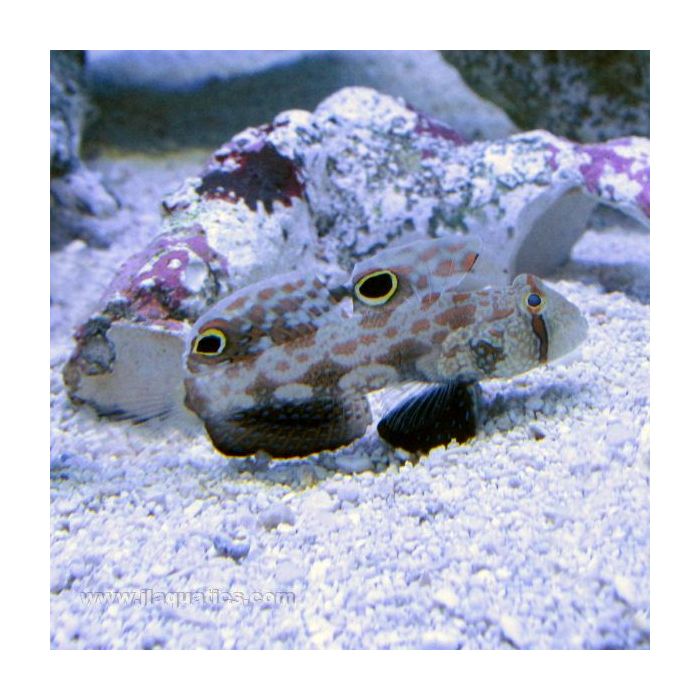Signal Goby (Asia Pacific)
The Signal goby is a fascinating and beautiful fish best reserved for experienced aquarists. Its most notable features are its two oversized dorsal fins, each one adorned with a large and decorative eyespot. These spots have earned it the name crab-eye goby, as it may raise its fins and swim sideways, mimicking a crab. Its lower fins are black as night and covered in tiny blue spots like stars in the sky. Hazelnut colored splotches coat its pale body, and streak down from under its eyes. Males and females are visually identical.
The Signal goby obtains nearly all its food from within the sand, and live food is especially important. Although the fish is small we recommend a well established aquarium no less than 50 gallons, and preferably larger, with plenty of open sand for the fish to sift through. A refugium is helpful in supplementing the main aquarium with live prey items. Fish who directly compete with it for food should be avoided, primarily sleeper gobies. If pestered by aggressive fish it will hide and fail to obtain enough food. Their bottom sifting activities also leave them vulnerable to intestinal parasites and we recommend de-worming them before adding to a display aquaria. It should be offered frozen food items on the sand several times a day.
Sand gobies are small, peaceful fish which spend most of their day hopping around on the substrate in an entertaining manner. A fine sand bed of at least two inches will help them feel secure.
We recommend the tank be securely covered as sand dwelling gobies may be prone to jumping from open top aquaria. They may be territorial to others of the same or similar species, however if two fish are added to a sufficiently large aquarium at the same time it may be possible to keep a pair. They are typically peaceful with all other types of fish.
Sand gobies are primarily carnivores and their diet should include plenty of high quality meaty items, marine algae, Spirulina, and frozen Mysis shrimp. It is preferable to feed more than once a day and to let some food land on the bottom of the aquarium. Frozen food is best, however in time they usually learn to eat dry foods.
As one of the largest families of fish there are near countless varieties of gobies which inhabit every different niche on the reef. They are coral safe and typically quite active and friendly with other fish. They have the ability to change sex to form pairs, although they don't always do so. Most gobies are imported from the Philippines.
Gobies are diminutive fish typically with elongated bodies, and as such we do not recommend any aggressive or large-mouthed fish to be kept with them; this includes all groupers, snappers, sweetlips, soapfish, lionfish, eels, goatfish, anglers/frogfish, leaf fish, etc.
















